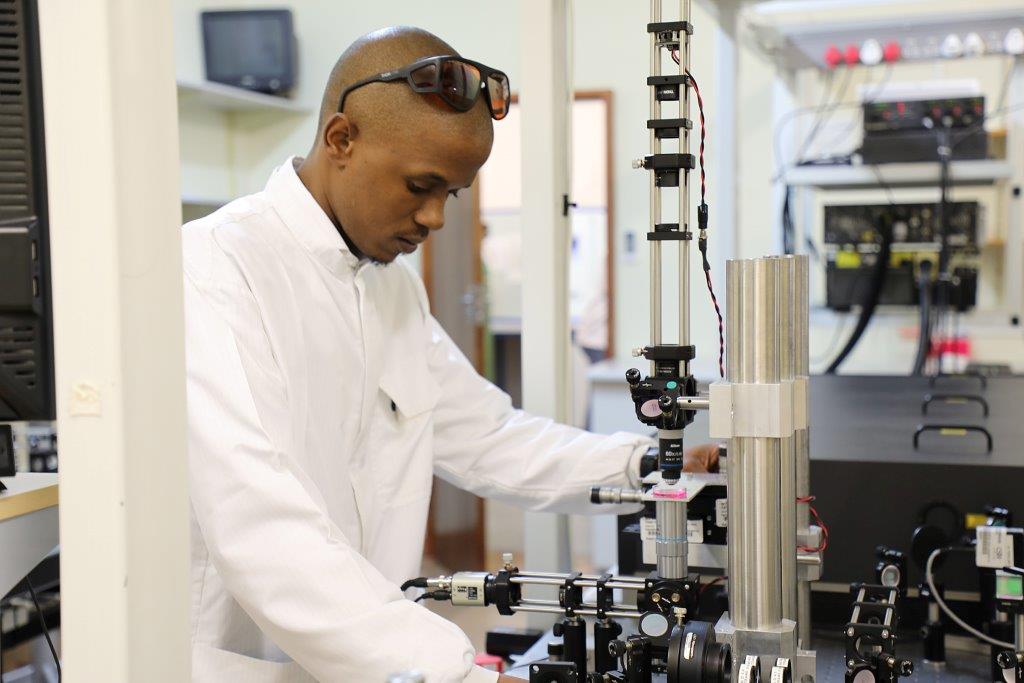The Council for Scientific and Industrial Research (CSIR) presented its research findings on laser-based HIV diagnostics at the world’s largest photonics conference in California, San Franciso.
Lebogang Thobakgale (28) is the youngest researcher who represented the CSIR biophotonics team at the Society of Photo-optical Instrumentation Engineers (SPIE) Photonics West conference on 27 January to 2 February 2018.
Organised by SPIE, an international society for optics and photonics, the conference attracted thousands of researchers and technology developers from around the globe to discuss and learn about the latest photonics products and technologies.
At the conference, Thobakgale shared some of the CSIR’s research on femtosecond laser assisted photo-transfection and differentiation of mouse embryonic stem cells. This entails using lasers to insert DNA into cells for the purpose of making different types of cells. Another presentation was based on Label-free detection of HIV-1 infected cells where lasers are used to trap cells and detect HIV-1 without the need for chemical markers via integration of optical tweezers and photoluminescence spectroscopy.
The CSIR provides a critical core of laser technology knowledge and expertise through the research, development and implementation of laser based technologies and applications in Africa. This knowledge enables the South African industry to improve their global competitiveness and expand their market share.
Speaking after the conference, Thobakgale said the opportunity to represent the country and the CSIR was an exciting moment for him.
“The opportunity to present our research findings on laser-driven label-free approaches of detecting HIV-1, which is the novel, high specific and unique, in living biological cells was an exciting experience. The “Label-free” detection project is centred on detecting and distinguishing differences between HIV infected cells against non-infected cells,” says Thobakgale.
The young CSIR researcher also had the opportunity to engage with scientists and engineers in the fields of spectroscopy and nanoscience on the advancement of biosensor technology and the challenges they experience in their respective countries. This technology detects and describes the molecular content of samples using lasers and the study of their dimensions at a nano-scale level.
“I had really fruitful engagements which made me realise that South Africa is not far behind in advancing their own research with respect to what is being done in other continents. Like many of us, they too, experience the same challenges. This made me feel confident in the sense that, the problems are not necessarily continent specific, meaning with our own unique innovative thinking and motivation, we have the capabilities to get closer to their technical levels in respect to biosensor research. With that said, we as young SA scientists have a tendency to shy away from the unknown in fear of not succeeding or matching up with international standards. This made me realise the importance of local and international collaborations with like minds, so as to fast track our training towards being more confident in our own skills, taking calculated risks that lead to more published articles and ultimately, producing technology demonstrators that can be showcased on world stage.” Lebogang also had the opportunity to share the research on femtosecond laser. He said the femtosecond project focuses on genetic manipulation of stem cells to produce other types of cells found in mammals.
“Our group aims to apply optical/ photonics methods in the biological fields for the purpose of detection, diagnosis and screening of various cell-based diseases that are currently plaguing our country,” he said.
Thobakgale said the research was critical to treat cell-based ailments like Parkinsons, liver and heart disease.
“Currently, the country’s ability to develop medical devices is being hindered by imports from other countries.”
The young researcher said the skills he gained will assist him to develop a biosensor system to diagnose and screen the progression of cancers in patients undergoing therapy in rural areas.
“At an advanced stage, my wish is to see such a study bring out a new photonics screening database that will help both scientists and medical doctors to better understand the broad spectrum of how these diseases thrive in our communities countrywide,” he said.

ENDS
For more interviews and information, please contact:
David Mandaha: CSIR Media Manager
Tel: 012 841 3654 or 072 126 8910
Email: @email
Follow us on social media:
Twitter: @CSIR. Facebook: CSIRSouthAfrica. Instagram: CSIRSouthAfrica. LinkedIn: Council for Scientific and Industrial Research (CSIR). Youtube: CSIRNewMedia
Contact Person: David Mandaha: CSIR Media Manager, @email, +12 841 3654/ 072 126 8910